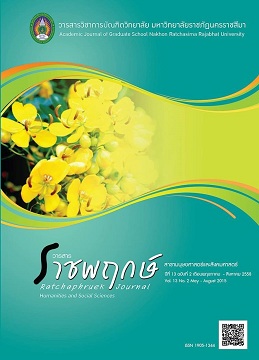แนวทางการพัฒนาการดำเนินด้านสุขภาพของเจ้าหน้าที่ผู้ปฏิบัติงานด้านสุขภาพ สังกัดองค์การบริหารส่วนตำบลในจังหวัดนครราชสีมา
Main Article Content
Abstract
การวิจัยครั้งนี้มีวัตถุประสงค์เพื่อศึกษาแนวทางการพัฒนาการดำเนินงานด้านสุขภาพของเจ้าหน้าที่ผู้ปฏิบัติงานด้านสุขภาพ สังกัดองค์การบริหารส่วนตำบล ในจังหวัดนครราชสีมา กลุ่มตัวอย่างเป็น เจ้าหน้าที่ผู้ปฏิบัติงานด้านสุขภาพจำนวน 154 คน ได้มาโดย การสุ่มกลุ่มตัวอย่างแบบกลุ่ม และกลุ่มเป้าหมายในการสนทนากลุ่ม จำนวน 10 คน โดยเลือกแบบเจาะจง เครื่องมือที่ใช้เป็นแบบสอบถามการดำเนินงานด้านสุขภาพของเจ้าหน้าที่ผู้ปฏิบัติงาน ด้านสุขภาพ สังกัดองค์การบริหารส่วนตำบล ในจังหวัดนครราชสีมา และแนวทางการสนทนากลุ่ม วิเคราะห์ข้อมูลด้วยสถิติการแจกแจงความถี่ร้อยละ ค่าเฉลี่ย ส่วนเบี่ยงเบนมาตรฐาน และทดสอบค่าที (t-test) และการวิเคราะห์เนื้อหา
ผลการวิจัยพบว่า 1) ด้านการสร้างเสริมสุขภาพ มีการจัดกิจกรรมการออกกำลังกายในชุมชนอย่างสม่ำเสมอในระดับต่ำสุด ( = 2.94, S.D. = 1.07) แนวทางการพัฒนาคือ ก่อนมีการจัดกิจกรรมการออกกำลังกายในชุมชน ควรมีการศึกษาท้องถิ่น หรือชุมชนถึงวิถีชีวิต วัฒนธรรม ขนบธรรมเนียมประเพณีของแต่ละพื้นที่ เพราะท้องถิ่นหรือชุมชนเป็นตัวแปรสำคัญในการดำเนินงานด้านสุขภาพให้บรรลุเป้าหมาย 2) ด้านการป้องกันโรค มีการดำเนินงานการบริหารจัดการที่ดินในการกำจัดขยะมูลฝอยและสิ่งปฏิกูลตามมาตรฐานที่ก????ำหนดในระดับต่ำสุด (
= 2.66, S.D. = 1.26) มีแนวทางการพัฒนาคือผู้บริหารระดับสูงควรให้ความสำคัญกับปัญหาการกำจัดขยะมูลฝอยและสิ่งปฏิกูล กำจัดให้ได้ตามมาตรฐานของระบาดวิทยา ควรให้ความสำคัญกับการ ประชาสัมพันธ์ การแจ้งข่าวสาร แบบหลายช่องทางในการป้องกันโรค โดยเฉพาะโรคที่เกิดตามฤดูกาลและมีสาเหตุสำคัญที่มาจากขยะมูลฝอยและสิ่งปฏิกูลในท้องถิ่น และควรให้ความสำคัญในการแนะนำการจัดการขยะติดเชื้อกับผู้ป่วยเบาหวานที่ฉีดยาเองในพื้นที่ หรือจัดอบรมให้ความรู้กับผู้ป่วยในกรณีที่มีจำนวนผู้ป่วยในท้องถิ่นปริมาณมาก 3) ด้านการฟื้นฟูสมรรถภาพ มีการดำเนินโครงการด้านการฟื้นฟูสมรรถภาพ โดยมีงบประมาณที่เพียงพอในระดับต่ำสุด (
= 3.04, S.D. = 0.88) แนวทางการพัฒนาคือ ควรมีบุคคลสำคัญในพื้นที่สนับสนุนด้านงบประมาณในการดำเนินงานด้านการฟื้นฟูสมรรถภาพ เช่น ผู้บริหารองค์การบริหารส่วนตำบล และเจ้าหน้าที่ผู้ปฏิบัติงานฝ่ายต่างๆรวมถึงผู้นำชุมชน ในรูปแบบการรับบริจาค เน้นผู้พิการ ผู้สูงอายุ ผู้ด้อยโอกาสที่ยากจนและไม่มีผู้ดูแลก่อนอันดับแรก
Guidelines on Operational Health for Healthcare Practitioners in Nakhon Ratchasima Sub-district Administration Organizations
This research aimed to develop the operational health for health practitioners in sub-district administration organization in Nakhon Ratchasima. Samples were 154 health practitioners who were obtained by cluster random sampling and 10 health practitioners were in the focused group discussion that were obtained by purposive sampling. The research tools were rating scale questionnaires with 69 items of multiple choices and focused group discussion. Data was analyzed by statistical method to find frequency, percentage, mean, standard deviation, t-test and concluded in from of descriptive statistics.
The research results indicated that: 1) Health promotion- For providing regular activity of exercise in communities, it was found that there was practiced in the lowest level ( = 2.94, S.D. = 1.07). The development guideline was to study locals or communities’ way of life, culture, custom, and tradition of each area because locals or communities were major factors for achieving all goals of health operation, 2) Disease prevention- For land administration for garbage disposal, it was found that there was practiced in the lowest level (
= 2.66, S.D. = 1.26). The development guideline was to let the top administrators place their interests on the garbage disposal in accordance with epidemiological standards that would spend higher budget. They should also focus on making public relation via multichannel information, especially seasonal diseases or those caused by managing local garbage and suggest how to dispose infectious wastes for diabetic patients who made self- injection in the area or should provide knowledge on health in case of many patients in their area, 3) Rehabilitation- For operations on rehabilitation with sufficient budget, it was found that there was practiced in the lowest level (
= 3.04, S.D.= 0.88). The development guideline was to have some powerful persons for supporting budget on operations of rehabilitation the administrators of sub-administrators of sub-district administrative organizations, practitioners from various aspects and community leaders in form of donation to with the priority on the handicapped, elderly and social disadvantaged local members.


